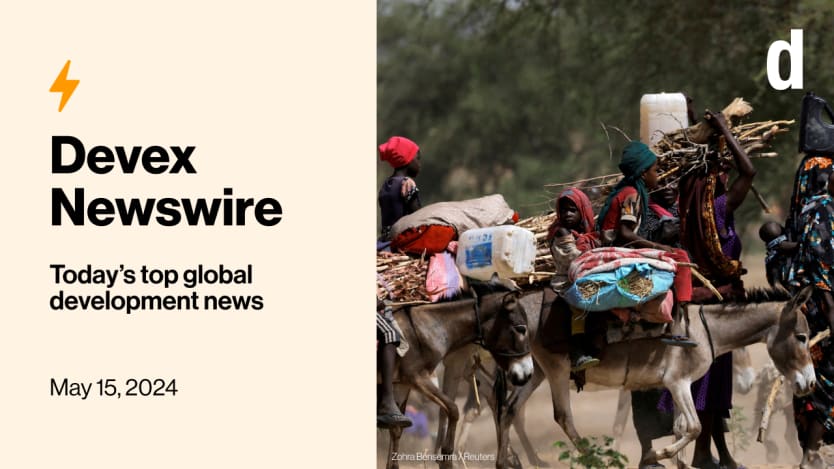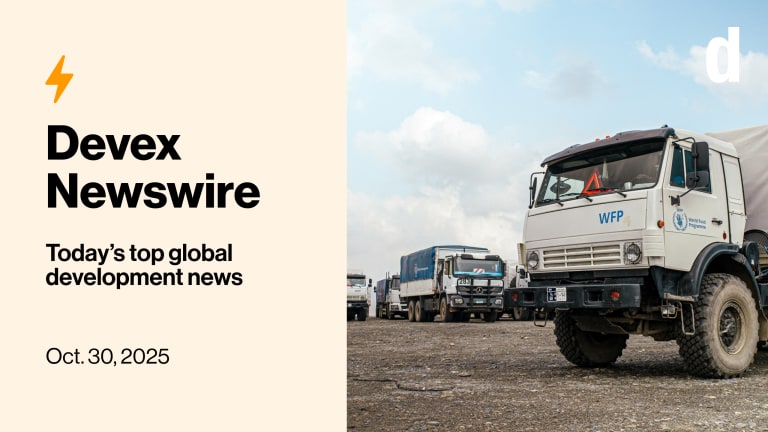Devex Newswire: Global internal displacement hits record 75.9 million people

In 2023, more people than ever are refugees in their own country, mostly due to conflict and disasters. Sudan, the Palestinian territories, and the Democratic Republic of Congo topped the list, highlighting an urgent need for improved conflict prevention and peace building.
Also in today’s edition: We look at the U.K.’s recovery efforts in Gaza, and ask how much aid goes to fragile states.
+ Why are European aid donors slashing their budgets? And what might upcoming elections mean for the future of European aid? Find out at our event today. Register now. Can’t attend live? Register anyway and we’ll send you a recording.
‘Damning verdict’
This is a preview of Newswire
Sign up to this newsletter for an inside look at the biggest stories in global development, in your inbox daily.
As relentless turmoil continues in regions such as Sudan and the Palestinian territories, an uncomfortable reality emerges — the number of internally displaced individuals rose to 75.9 million at the close of 2023, an increase of almost 50% in five years.
The figure is part of a harrowing trend: This number has risen every year for the past seven years. The majority — 68.3 million — have been forced to flee within their own borders due to fighting, while 7.7 million were uprooted by disasters, according to the Internal Displacement Monitoring Centre, which released the data Tuesday.
“We have never, ever recorded so many people forced away from their homes and communities,” said Jan Egeland, secretary-general of the Norwegian Refugee Council, in a press statement. “It is a damning verdict on the failures of conflict prevention and peace-making.”
Sudan, the Palestinian territories, and the Democratic Republic of Congo bore the brunt, accounting for nearly two-thirds of the year's new displacements, writes my colleague Elissa Miolene. Sub-Saharan Africa, in particular, witnessed the ordeal, hosting almost half of all those displaced.
Sudan, gripped by civil war since April last year, was the displacement epicenter, with 9.1 million forced from their homes. Within just six months of the conflict's start, Sudan had already become the site of the world's largest internal displacement, according to the International Organization for Migration.
Syria held the second-highest number of internally displaced, followed by DRC, Colombia, and Yemen. And in Gaza, hostilities since Hamas' Oct. 7 assault on Israel has brought on 3.4 million individual displacements in the fourth quarter of 2023 alone — 83% of Gaza’s population and 17% of the year's total displacements worldwide.
Read: Number of internally displaced people reaches record high, again, in 2023
+ Devex is officially on Telegram and WhatsApp! Join our channels to receive updates on the latest globaldev news directly to your mobile device.
Prime time
Unlock Aid, an advocacy group dedicated to reforming international aid, is gearing up to launch a new platform they’ve dubbed "Glassdoor for Primes." The tool aims to allow subgrantees to publicly review their prime counterparts, shedding light on vital aspects such as funding commitments, decision-making processes, intellectual property, and equity practices. With the aim of promoting accountability and fairness, Unlock Aid's initiative aims to transform the aid landscape, ensuring that smaller and local organizations can identify trustworthy partners amid a sea of major players.
“Too often, we’ve heard the same stories: organizations would be promised the world to help another organization win a proposal, only to get cut out of the award later on,” says Walter Kerr, the co-executive director of Unlock Aid. “This portal can provide more sunlight into which of these bigger international companies are good partners to smaller and local groups, and which ones are not.”
Read more: 'Glassdoor for Primes' seeks to boost aid industry accountability (Pro)
+ A Devex Pro membership gives you access to all our expert analyses, funding data, exclusive events, networking opportunities at our summits, and more. Not a Pro member yet? Start your 15-day free trial today.
Actions speak louder
A year ago, the United Kingdom put itself at the heart of help for Ukraine’s recovery from war by hosting an international conference at which nations gave $2 billion and 18 development finance institutions collaborated to secure investments.
Twelve months on, the destruction of Gaza, Khan Younis, and — probably soon — Rafah echo the plight of Kyiv and Mariupol, so Parliament’s International Development Committee urged the U.K. government to repeat that conference’s success, writes Devex U.K. Correspondent Rob Merrick.
“The recovery in Gaza will be arguably longer and harder, given the economic basis from which it was starting,” its report warned, calling for “Palestinian businesses who have been involved in rebuilding Gaza previously” to join donors at a fresh conference.
The government’s response has now arrived, and it agrees “the international community must consider recovery and reconstruction now,” even as Israel prepares to step up its assault in the south of Gaza.
But it adds: “We are not at this stage ready to commit to the UK hosting an international conference” — without saying why not. Sarah Champion, the committee’s chair, criticized “warm words” without action, also noting the government is still dodging the question of restoring funding to UNRWA, the U.N. agency helping Palestinian refugees.
Last year, the bill for the Ukraine reconstruction was put at $441 billion. At the start of May, the United Nations said the cost of rebuilding Gaza could hit $50 billion and is “increasing exponentially by every day of fighting.”
Fragile balance
Given the dire scenario above, it’s no surprise donors weigh numerous factors when distributing aid, from anticipated development outcomes to geopolitical strategies. But one crucial consideration stands out: A nation's susceptibility to natural disasters and human conflicts.
Each year, the World Bank unveils its roster of countries most vulnerable to social, economic, and institutional fragility, as well as violence, drawing from “publicly available global indicators.” These nations fall under the banner of fragile and conflict-affected states, or FCS.
Fragile states, characterized by a lack of institutional and governance capacity, form the front line of this battle for stability and progress. The latest World Bank assessment identifies 19 such nations, up from 17 in 2022.
According to the International Monetary Fund, around 1 billion people in FCS need assistance. If not addressed, FCS may account for 60% of “the global poor” by 2030. At the same time, conflict-affected states, measured by per capita deaths resulting from hostilities, endure the grim realities of violence and upheaval. While the count of these afflicted nations has slightly decreased, with 20 on the list, the toll of conflict remains staggering.
Devex data analyst Miguel Antonio Tamonan looks into the disbursement data from the Organisation for Economic Co-operation and Development to see how much aid the Development Assistance Committee member countries allocated to FCS between 2018 and 2022, which among the recipients got the largest share, and what the priority areas were.
Read: How much aid goes to fragile and conflict-affected states? (Pro)
Related read: How much ODA reaches low- and middle-income countries? (Pro)
The French disconnection
The French development agency’s latest survey on how Europeans view foreign aid is out, with some interesting results. Just 66% of French people are now in favor of their country supporting low- and middle-income countries — down from 82% in 1983, writes Devex Senior Reporter Vince Chadwick.
By contrast, 87% of Italians favored supporting LMICs. A total of 6,257 adults were polled across France, Germany, Italy, Poland, and Sweden. Asked how interested they were in international development on a scale of zero to 10, the average rating was 6.2.
But that interest appeared driven by concern too: Asked what impact political, economic, climate and demographic changes in LMICs will have on their own lives, only 33% of respondents across the five EU countries thought the impact would be positive. You can see a summary in the French paper, La Tribune.
ICYMI:
• Is Macron still an aid champion? (Pro)
• 'Dangerous' moment for aid policy as EU braces for far-right surge (Pro)
In other news
EU government ministers approved 10 legislative measures for the new migration pact, anticipating migration to be a key issue as campaigning for next month’s Europe-wide elections intensifies. [AP News]
At a key Paris summit, governments, multilateral lenders, and oil companies pledged $2.2 billion to promote clean cooking in Africa to combat fatal respiratory diseases, carbon emissions, and deforestation. [Bloomberg]
British Prime Minister Rishi Sunak's new food security plan failed to boost farmers' short-term confidence, and may lead to a production drop next year, warns the National Farmers’ Union president. [The Guardian]
Sign up to Newswire for an inside look at the biggest stories in global development.
Search for articles
Most Read
- 1
- 2
- 3
- 4
- 5








